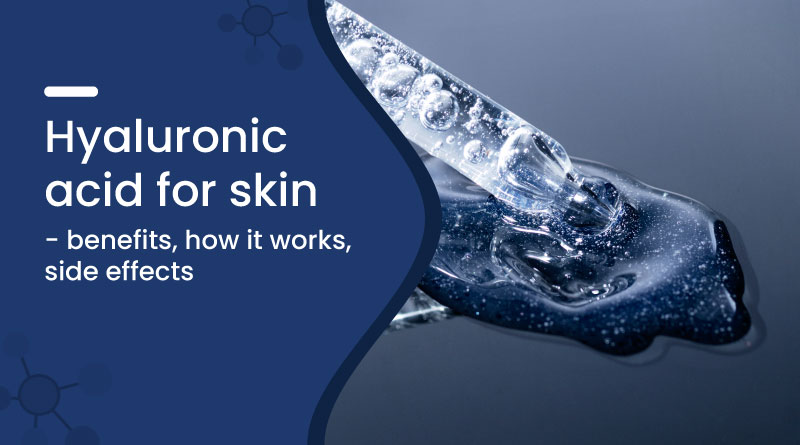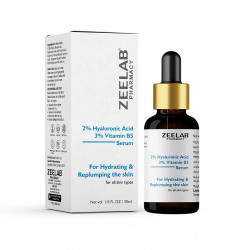Hyaluronic Acid For Skin - Benefits, How it Works, Side Effects


Hyaluronic Acid (HA) is a popular skincare ingredient known for its powerful hydrating properties. But what exactly is it, and why is it becoming a staple in skincare routines? This blog by Zeelab Pharmacy will explore everything you need to know about Hyaluronic Acid, its benefits, usage, and how it compares to other moisturizers.
What is Hyaluronic Acid?
Hyaluronic Acid is a naturally occurring molecule found in the human body, particularly in the skin, connective tissues, and eyes. This makes it an incredible hydrator, essential for keeping the skin plump and moist. It is also found in joint fluids and helps to cushion and lubricate the joints.
In skincare, Hyaluronic Acid is often included in serums, moisturizers, and creams. It comes in different molecular weights, which determine how deeply it can penetrate the skin.
Benefits of Hyaluronic Acid for Skin
-
Deep Hydration: It helps in reducing dryness and flaky skin, making it look fresh and dewy.
-
Improves Skin Elasticity: By keeping the skin well-hydrated, Hyaluronic Acid improves skin elasticity, making it appear firmer and more youthful.
-
Reduces Fine Lines and Wrinkles: Regular use of Hyaluronic Acid can visibly reduce fine lines and wrinkles by plumping up the skin.
-
Soothes Inflammation: It has calming properties that help soothe irritated skin, making it an excellent ingredient for sensitive skin.
-
Supports Wound Healing: Hyaluronic Acid plays a key role in skin repair and regeneration. It speeds up the healing of wounds, cuts, and abrasions by promoting cell turnover and collagen production.
-
Enhances Skin Texture: Regular use of Hyaluronic Acid can smooth rough and uneven skin texture, giving it a soft, silky feel. It helps in refining the appearance of the skin, making it look polished and glowing.
-
Oil-Free Hydration for Acne-Prone Skin: Unlike heavy moisturizers that can clog pores, Hyaluronic Acid provides lightweight, non-greasy hydration, making it perfect for acne-prone and oily skin types.
How Does Hyaluronic Acid Work on Skin?
Hyaluronic Acid works by acting as a humectant. A humectant is a substance that draws moisture from the environment and binds it to the skin. When applied, it forms a protective layer on the skin, trapping moisture and preventing it from evaporating. When used consistently, it helps in maintaining a balanced moisture level, giving the skin a healthy glow.
Can Hyaluronic Acid Help with Acne or Oily Skin?
Yes, Hyaluronic Acid can be beneficial for acne-prone or oily skin:
-
Balancing Oil Production: When the skin is properly hydrated, it signals the sebaceous glands to produce less oil, reducing greasiness.
-
Non-Irritating: It does not irritate the skin or clog pores, which is crucial for acne-prone individuals.
-
Helps Heal Acne Scars: The hydrating and soothing properties of Hyaluronic Acid can aid in healing acne scars by keeping the skin soft.
Side Effects of Hyaluronic Acid
Hyaluronic Acid is generally safe for all skin types. However, in rare cases, some people might experience:
-
Skin Redness: Mild redness or irritation may occur, especially if the product contains other active ingredients like Vitamin C or Retinoids.
-
Allergic Reactions: Though rare, some individuals may be allergic to Hyaluronic Acid or other components in the product formulation.
-
Dryness in Low Humidity: In extremely dry climates, Hyaluronic Acid might pull moisture from the deeper layers of the skin instead of the air, causing dryness. To avoid this, always layer it with a good moisturizer.
Is Hyaluronic Acid Suitable for All Skin Types?
Yes, Hyaluronic Acid is suitable for all skin types:
-
Dry Skin: Provides deep hydration and helps combat flakiness.
-
Oily Skin: Balances oil production without clogging pores.
-
Sensitive Skin: Its soothing properties help reduce irritation.
-
Aging Skin: Reduces the appearance of fine lines and wrinkles.
Foods That Are High In Hyaluronic Acid
-
Bone Broth: Rich in collagen, which is essential for skin elasticity and hydration.
-
Leafy Greens: Spinach, kale, and Swiss chard support Hyaluronic Acid synthesis with magnesium.
-
Root Vegetables: Sweet potatoes, carrots, and beets are rich in magnesium and potassium.
-
Nuts and Seeds: Walnuts, almonds, chia seeds, and flaxseeds are great for Hyaluronic Acid production.
-
Tomatoes: Contain lycopene, an antioxidant that supports Hyaluronic Acid levels.
-
Almonds and Pumpkin Seeds: Loaded with zinc, essential for Hyaluronic Acid production.
FAQs About Hyaluronic Acid for Skin
Q. How often can I use Hyaluronic Acid?
A. You can use Hyaluronic Acid daily, both in the morning and at night, as part of your skincare routine.
Q. Should I apply Hyaluronic Acid on wet or dry skin?
A. For best results, apply Hyaluronic Acid on slightly damp skin. It helps the product to lock in more moisture.
Q. Can I use Hyaluronic Acid with other active ingredients?
A. Yes, Hyaluronic Acid is versatile and can be safely combined with other active ingredients like Vitamin C, Retinoids, and Niacinamide.
Q. Is Hyaluronic Acid safe during pregnancy?
A. Yes, it is generally considered safe for use during pregnancy, but it’s always a good idea to consult with a healthcare professional.
Q. Can I use Hyaluronic Acid in my 20s?
A. Absolutely! Starting a Hyaluronic Acid regimen early can help maintain hydration and prevent premature aging.
Conclusion
Hyaluronic Acid is a powerhouse ingredient that offers deep hydration, skin plumping, and anti-aging benefits. Its versatility and compatibility with all skin types make it a must-have in any skincare routine. At Zeelab Pharmacy, we offer a range of Hyaluronic Acid products that are affordable and effective, helping you achieve healthy, glowing skin.
2% Hyaluronic Acid + 3% Vitamin B5 Serum
30ml In 1 Bottle
Recent Blogs
Disclaimer : Zeelab Pharmacy provides health information for knowledge only. Do not self-medicate. Always consult a qualified doctor before starting, stopping, or changing any medicine or treatment.

















 Added!
Added!